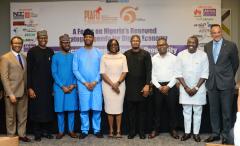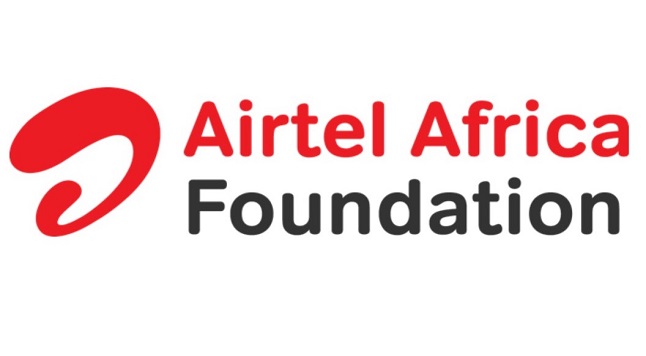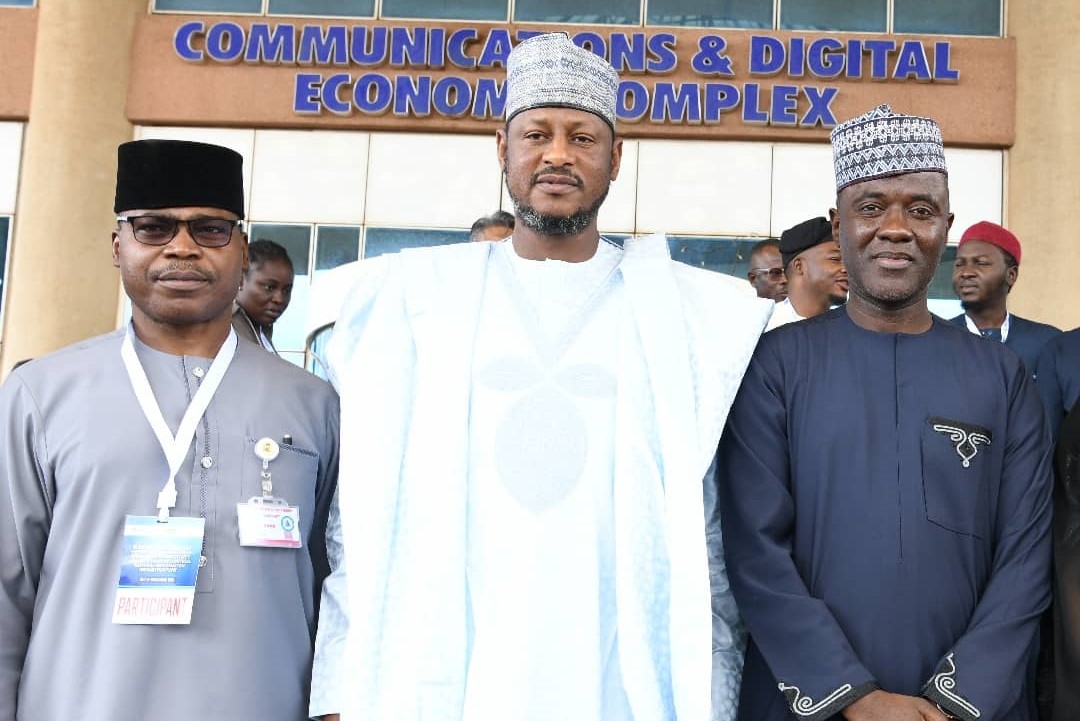Telecom
Stakeholders @PIAFo Identify Obstacles to FG’s 90,000km Fibre Project

Stakeholders in the telecommunications industry have said the Federal Government’s plan to deploy 90,000 kilometers of fibre optic cables across the country will face several obstacles, especially from state governments, that might truncate the project.

L—R: Executive Director, Broadbased Communications Limited, Chidi Ibisi; National Chairman, Association of Licensed Telecoms Operators of Nigeria, Engr. Gbenga Adebayo; Chief Operating Officer, WTES Projects Limited, Chidi Ajuzie; Chief Executive Officer, Skymax Integrated Networks Limited, Engr. Chidi Charles Agukwe; Deputy Director, Policy, Competition and Economic Analyses, Nigerian Communications Commission, Mrs. Freda Bruce-Bennett; the Convener of Policy Implementation Assisted Forum (PIAFo), Mr. Omobayo Azeez; Lucky Anumaka, Manager, Managed Services and Operations, Zora Communications Limited; Co-founder/Executive Director, Infratel Africa, Dr. Tola Yusuf; and the Chief Executive Officer, Open Access Data Centre, Dr. Atotunde Coker at the sixth edition of PIAFo on Digital Economy held on Wednesday in Lagos.
According to them, without addressing the current issue of Right of Way charges, multiple taxation, and levies, which are under the control of state governments, the project which is to be implemented through a Special Purpose Vehicle (SPV) would be an exercise in futility.
The stakeholders, who spoke during the Sixth Edition of the Policy Implementation Assisted Forum (PIAFO) in Lagos on Wednesday, which was a focus on Nigeria’s renewed strategic agenda for digital economy.
They stressed the need to ensure the successful implementation of the project which was announced recently by the Federal Government to complement existing connectivity for universal access to the internet across Nigeria and provide the Nigerian digital economy with the backbone infrastructure it needed.
Addressing the obstacles
Presenting a paper on the topic, ‘Harmonizing Nigeria’s Fibre Deployment Strategies for Effective Implementation’, Executive Director of Broadbased Communications, Mr. Chidi Ibisi, said while the government’s SPV initiative is a good plan that could help the country bridge its current digital infrastructure gap, the government would need to address current challenges.
“The issues of high cost of Right of Way (RoW), destruction of fiber by road construction companies and vandals all need to be addressed for this new SPV initiative to be successful,” he said.
Highlighting some of the challenges telecom operators face when deploying infrastructure, the Group Chief Operating Officer of WTES Projects Limited, Mr. Chidi Ajuzie, said the biggest challenge to fibre cable laying in Nigeria is the informal RoW by hoodlums in states.
“For states, a formal right of way is set and some states are adopting it but the informal side of the right of way is where the complexity has come today.
“If I’m trying to lay fibre in some communities here in Lagos, the first thing that happens is the so-called land owners (omo onile) come out and a different set of people will keep coming from one street to another and they charge you. How do we achieve adequate broadband infrastructure in this kind of situation?” he said.
Role of state governments
According to the Chairman of the Association of Licensed Telecommunications Operators of Nigeria (ALTON) Engr. Gbenga Adebayo, for the 90,000 kilometres fibre project to succeed, the state governments have to take ownership.
“For the project to succeed, I think the governments at sub-nationals should take ownership. This issue of state governments seeing right of way as IGR should be a thing of the past. We can’t talk about the digital economy on one side and the government is seeing those who provide the services as sources of revenue.
“The government has always come up with good policies, but the implantation, particularly when they are tested far afield, is the biggest problem. Governors will go to Abuja and say ‘in my state, I will give the right of way free of charge.’
“When you go to such a state, they may give you the right of way for zero or one Naira, but they will give you developmental levy, education levy, state impact levy, ecosystem levy. When you add all of these together, it is more than the right of way charges. So, who is playing who?” he said.
Making vital contributions at the forum, Dr. Ayotunde Coker, the Chief Executive Officer of Open Access Data Centre (OADC) stressed the need for the fibre project to be executed by the private sector even as the World Bank is expected to fund it with up to $3 billion.
He said: “the World Bank can put money into the government but it needs private sector partnerships as the execution engine and that’s what we’ve been pushing in Africa.
“The key thing is that when the World Bank puts the money in, it should engage the private sector, figure out the policies that it needs to do and enable the private sector to execute them effectively and make it as open as possible. With that, they can achieve what they are trying to achieve.”
He further stressed that for the success of the project, Nigeria should learn lessons of what didn’t work in the past, to achieve the new broadband penetration targets with the fibre range that is required.
“Meaningful broadband is what we need, rather than just a huge set of megabits per second implementation. We need superhighway fibres. We need the distribution of these backbone that allows us then to fan out.”
He further urged state governors to be part of the project by providing an enabling environment for infrastructure roll-out, adding: “if you are a state governor and didn’t participate in it, the state won’t grow and it’s going to impact your state.”
Earlier in his opening address, the convener of PIAFo, Mr. Omobayo Azeez, said the conference was to create a midpoint dialogue platform for digital economy stakeholders across both the public and private divides to brainstorm, exchange perspectives, clear grey areas, harmonize thoughts and create a sense of collective responsibility towards accelerating our collective prosperity through technical efficiency.
The event focused on Nigeria’s renewed strategic agenda for digital economy. According to him, the new digital economy blueprint of the federal government does not only sustain existing policy directions and targets, “it also challenges us on the possibilities of attaining new frontiers with a view to “Accelerating Our Collective Prosperity through Technical Efficiency” which is the theme of the summit.
Telecom
Airtel Africa Foundation Launches 100 Tech Scholarships for Nigerian Undergraduates

Following the recent announcement by its Chairman, Dr. Segun Ogunsanya, at a World Press Conference held in Lagos recently, the Airtel Africa Foundation, through Airtel Nigeria, has kicked off its Undergraduate Tech Scholarship Programme to benefit 100 Nigerian undergraduates.

This initiative will provide each recipient with a grant covering tuition, accommodation, study materials, and a stipend from the first year of study through the final year. This financial aid removes economic barriers, empowering students to dedicate their focus to academic and technical achievement in technology.
Eligible courses of study include Computer Science, Information Technology, Data Science, Software Engineering, Cybersecurity, Artificial Intelligence, and other ICT-related disciplines.
Commenting on the initiative, Dr. Ogunsanya affirmed that the scholarships represent the Foundation’s continued commitment to breaking down barriers for young Africans.
“At Airtel Africa Foundation, our vision has always been to create opportunities where talent meets ambition. With this scholarship, we are investing in Nigeria’s future tech leaders, giving them the resources and confidence to thrive in an increasingly digital world,” he stated.
Beneficiaries are selected from 100-level students enrolled in approved programmes in participating public universities across the country. These institutions include the University of Lagos (UNILAG), the University of Nigeria, Nsukka (UNN), Ahmadu Bello University (ABU), the University of Benin (UNIBEN), Obafemi Awolowo University (OAU), the University of Ilorin (UNILORIN), and Tai Solarin University of Education (TASUED).
Airtel Nigeria CEO, Dinesh Balsingh, noted: “The prioritization of education as a pillar of our social investments becomes much stronger with these 100 new scholarships. They build on such other initiatives as our partnership with UNICEF on the Reimagine Education Programme, our Adopt-A-School project, and our 1 billion naira investment in the Three Million Technical Talent (3MTT) effort of the Federal Government. Ultimately, for us as an organisation, the best way to equip the future is to arm it with cutting-edge education.”
The undergraduate scholarship is a direct component of the Foundation’s four strategic pillars of Financial Inclusion, Education, Environmental Protection, and Digital Inclusion (FEED).
Telecom
NCC’s Maida Calls for Unified Action to Accelerate Broadband and Safeguard Telecom Infrastructure

Dr. Aminu Maida, Executive Vice Chairman of the Nigerian Communications Commission (NCC), has called for urgent collaboration among Nigeria’s states and stakeholders to accelerate broadband connectivity and safeguard critical national infrastructure.

L-R: Director, Critical National Assets and Infrastructure Protection, Office of the National Security Advisers (ONSA), Enebong Effiom; Executive Governor, Katsina State, Dikko Radda and Executive Vice Chairman/Chief Executive Officer, Nigerian Communications Commission (NCC), Dr. Aminu Maida, during a business roundtable on broadband investment and critical national infrastructure protection hosted by the Commission in Abuja on Wednesday (October 8, 2025).
Speaking at a business roundtable held at the NCC Digital Economy Complex on Wednesday, October 8, 2025, the EVC emphasized broadband as a national imperative for economic growth, security, and digital inclusion under the theme, “Right of Way and Protection of Broadband Infrastructure – The Road to Success in Broadband Investment and Connectivity.”
Dr. Maida began his remarks by underscoring the invaluable role of connectivity across industries, citing examples from Enugu’s industrial sector to security services relying on real-time data. “When connectivity fails, opportunities evaporate, productivity stalls—and in critical situations, lives can be put at risk,” he said.
He stressed that broadband today transcends faster downloads or video calls; it is the bedrock of economic inclusion and national resilience.
According to the EVC, Nigeria’s broadband penetration stood at approximately 48.81 percent as of August 2025, with over 140 million Nigerians online. Highlighting the sector’s contribution to GDP, he cited research indicating a 10 percent broadband increase could boost GDP by 1.38 percent in developing countries.
Expanding broadband access, Dr. Maida said, would multiply economic opportunities, enabling new jobs, services, and innovation hubs across Nigeria’s states.
He referenced Rwanda and India’s success stories, where coordinated investments in fiber infrastructure and digital governance transformed their economies into emerging digital powerhouses.
The EVC lauded the leadership of President Bola Ahmed Tinubu and Communications Minister Dr. Bosun Tijani for pursuing the National Broadband Plan (2020–2025) with ambitious targets of 70 percent broadband penetration and deployment of 90,000 kilometres of fiber backbone by year-end.
To this end, the NCC has translated these goals into strategic actions despite operational challenges.
Among the NCC’s key initiatives, Dr. Maida highlighted the Critical National Information Infrastructure (CNII) Presidential Order signed in June 2024, which empowers law enforcement agencies to combat vandalism, theft, and denial of service attacks on telecom infrastructure.
The Commission, working closely with the Office of the National Security Adviser (ONSA), has operationalized this order through a Telecommunications Industry Working Group focused on site security, maintenance, and access control.
Complemented by public awareness campaigns and collaboration with judicial and security institutions, this effort has led to the dismantling of major vandalism cartels over the past two years.
Addressing the historic challenge of high Right of Way (RoW) fees—levied variably by states and often hindering fiber rollout—the EVC disclosed successes in advocacy resulting in five additional states (Adamawa, Bauchi, Enugu, Benue, and Zamfara) waiving these fees, bringing the total to eleven states without RoW charges.
Seventeen other states have capped fees at the Nigerian Governors Forum benchmark of N145 per linear meter. Dr. Maida underscored ongoing efforts to achieve uniform, predictable RoW regimes nationwide, coupled with “dig-once” coordination with public works to share ducts and plans, cutting fiber damage and civil works costs.
The NCC further strengthened investor confidence by approving cost-reflective and competitive tariff rates earlier this year, prompting operators’ collective commitment of over $1 billion in broadband rollout investments across Nigeria.
To enhance market openness, the Commission has commissioned a wholesale fiber study to facilitate backbone sharing between owners and Internet Service Providers, unlocking last-mile expansion and faster backhaul.
On transparency, the Commission expanded performance disclosures, including outage reporting, quality of service dashboards, and compliance metrics to drive accountability.
Despite these achievements, the EVC highlighted continuing challenges: from January to August 2025, Nigeria recorded 19,384 fiber cut incidents, 3,241 equipment thefts, and over 19,000 cases of denied access to telecom sites, causing prolonged outages and increased security costs.
Further obstacles include fragmented and unpredictable RoW regimes, weak coordination with road authorities, energy supply volatility, multiple taxation, and bureaucratic permitting processes.
Dr. Maida warned of the urgency, citing the accelerating global digital race driven by artificial intelligence and outsourcing movements favoring low-cost, high-connectivity environments. “If our broadband backbone is weak, our youth will be marginalized, and our economy will likely not achieve its full potential,” he said, underscoring that communities without digital connectivity today are essentially invisible.
The EVC urged governors and state authorities to partner in enforcing telecom infrastructure as critical assets; adopt 100 percent RoW waivers or at minimum NGF benchmarks with clear timelines; institutionalize coordination between public works and operators; embrace transparency in fees and processes; establish state digital infrastructure funds to attract private fiber investment; and support energy resilience through hybrid and solar power at telecom sites.
Looking ahead, Dr. Maida announced two major NCC initiatives to be launched the next day: an Ease of Doing Business Portal offering a one-stop-shop for all 36 states and the Federal Capital Territory, and the Nigeria Digital Connectivity Index (NDCI), a framework to annually measure and publish states’ digital readiness and competitiveness to enhance accountability and drive improvements.
He concluded with a powerful call to action: “The digital revolution does not wait. Let us align, invest, and protect, for the prosperity of our people and the future of our nation.” He left the audience with one final question, “Will we align—or be left behind?”
This roundtable marks a pivotal moment in Nigeria’s journey toward a digitally inclusive and economically robust future, positioning broadband connectivity and its protection as strategic national imperatives.
Telecom
Google Empowers African Students with Free AI Tools for a Year

Google today announced a major initiative to support higher education across Africa by offering its premium AI subscription, Google AI Pro for free to university students for 12 months.

The offer is available to eligible students aged 18+ in Nigeria, Kenya, Ghana, Rwanda, South Africa, and Zimbabwe, providing them with access to Google’s most advanced AI tools to enhance their learning, research, and creative work.
Through Google’s most capable model, Gemini 2.5 Pro, this initiative will equip the next generation of African leaders, innovators, and creators with fundamental AI literacy. By placing powerful generative AI tools directly in the hands of students, Google is helping to prepare them for a workforce where AI proficiency is increasingly essential.
“We are seeing a new wave of innovation in Africa, driven by the energy and ingenuity of our young people,” said Alex Okosi, Managing Director for Google in Sub-Saharan Africa. “By providing students with access to our most advanced AI tools, we want to empower them to not only excel in their studies but also to become critical builders and shapers of the future. This offer is about democratizing access to technology and giving African students the skills to compete and lead on a global stage.”
The Google AI Pro plan provides a comprehensive suite of tools designed for the demands of academic and creative life:
Supercharged Learning and Research: With new features like Guided Learning to help students with in-depth research, summarizing academic papers, debugging code, and step-by-step guidance on complex problems.
Time-Saving Efficiency: Use Deep Research to generate comprehensive, cited reports from hundreds of web sources in minutes, transforming how students approach long-form assignments and dissertations.
Enhanced Organization and Creativity: Leverage NotebookLM to organize notes and connect ideas and use Veo 3 to instantly transform text prompts or images into short, high-quality videos for presentations and projects.
Massive Storage: Receive 2 TB of cloud storage across Google Drive, Gmail, and Photos, ensuring ample space for coursework, research data, and creative portfolios.
How to Sign Up
University students in eligible higher education institutions and countries can verify their status and activate the 12-month free plan by visiting gemini.google/students. The process is designed to be simple, requiring students to verify their status through various methods and to add or confirm a form of payment (without incurring any charges). The offer will be available for redemption for 60 days, from October 7, 2025, to December 9, 2025.
This student offer builds on Google’s long-standing commitment to Africa’s digital transformation through programs like the Google for Startups Accelerator Africa and the Digital Skills for Africa initiative, which have helped millions of people and businesses grow.

 Telecom2 days ago
Telecom2 days agoAkwa Ibom, T2 Set to Drive Digital Transformation

 E-Business2 days ago
E-Business2 days agoKaspersky, Partners Launch a Career Orientation Test to Inspire more Girls into Cybersecurity

 E-Financial2 days ago
E-Financial2 days agoAfDB to Lend Nigeria $500m in Fresh Budget Support

 Telecom2 days ago
Telecom2 days agontel Gets Fresh Capital Injection for 2026 Relaunch

 E-Financial2 days ago
E-Financial2 days agoCBN Releases New Guidelines, Caps POS Agent Daily Transactions at N1.2m

 Telecom1 day ago
Telecom1 day agoChronicles Software unveils free SuccessBOX.ng platform for SS3 students, announces ₦10m reward scheme

 E-Financial2 days ago
E-Financial2 days agoFidelity Bank Hosts Black-Tie Gala Honouring Afreximbank President Prof. Benedict Oramah

 E-Financial2 days ago
E-Financial2 days agoReps Plan to Regulate Cryptocurrency, PoS Operations

























